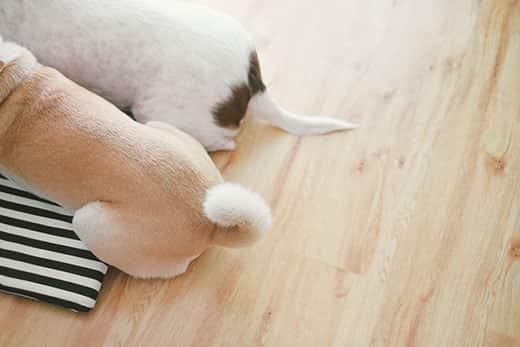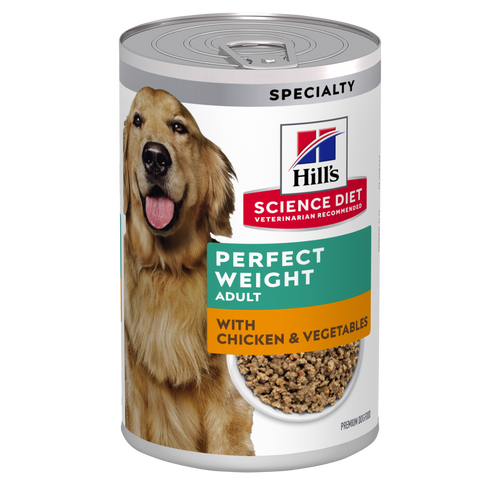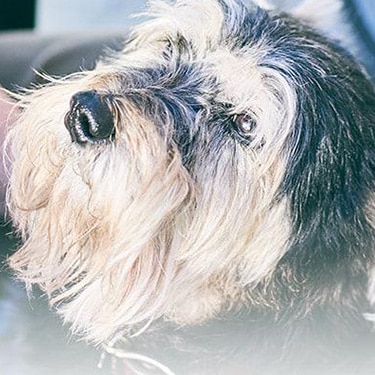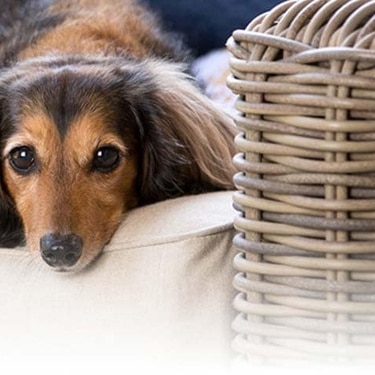
-
Find the right food for your petTake this quiz to see which food may be the best for your furry friend.Find the right food for your petTake this quiz to see which food may be the best for your furry friend.Health CategoryFeatured products
 Adult Perfect Weight & Joint Support Chicken & Brown Rice Recipe Dog Food
Adult Perfect Weight & Joint Support Chicken & Brown Rice Recipe Dog FoodThis weight management and mobility support dog food was created with Hill’s unique understanding of the biology of overweight dogs.
Shop Now Adult 6+ Large Breed Chicken Meal, Barley & Rice Recipe Dog Food
Adult 6+ Large Breed Chicken Meal, Barley & Rice Recipe Dog FoodSupports energy level, joint health, and beautiful coat in large breed mature dogs
Shop Now Healthy Mobility Large Breed Chicken Meal, Barley & Brown Rice Recipe Dog Food
Healthy Mobility Large Breed Chicken Meal, Barley & Brown Rice Recipe Dog FoodAdvanced nutrition shown to support joint health and improve mobility
Shop NowFeatured products Kitten with Salmon
Kitten with SalmonPrecisely balanced nutrition with the delicious taste of minced salmon to help build immunity and a healthy digestive system
Shop Now Adult Perfect Weight Salmon & Vegetable
Adult Perfect Weight Salmon & VegetableOver 70% of cats lost weight within 10 weeks when fed this nutrition
Shop Now Adult Indoor Savory Chicken Entrée Cat Food
Adult Indoor Savory Chicken Entrée Cat FoodPrecisely balanced nutrition for indoor cats with the delicious taste of savory minced chicken
Shop Now -
DogCat
- Cat Tips & Articles
-
Health Category
- Weight
- Skin & Food Sensitivities
- Urinary
- Digestive
- Kidney
- Dental
- Serious Illness
-
Life Stage
- Kitten Nutrition
- Adult Nutrition
Featured articles Water
WaterWater is the most important nutrient of all and essential for life. Animals can lose almost all their fat and half their protein and still survive, but if they lose 15% of their water, it will mean death.
Read More The Right Diet For Your Pet
The Right Diet For Your PetLearn what to look for in healthy pet food & nutrition, including ingredients, quality of the manufacturer, your pet's age, and any special needs they have.
Read More Pet Food Storage Tips
Pet Food Storage TipsWhere you store your cat and dog food can make a big difference in the quality and freshness once it is opened. Here are some common questions and recommendations for optimal storage for all of Hill’s dry and canned cat and dog food.
Read More -


Is your dog losing hair on their tail? You might be curious if it is just falling out due to age, a result of your dog chewing on their tail, or a larger health concern. Your dog’s itchiness and red skin could be a result of allergies, fleas, hormones, some kind of behavioral disorder, or in rare cases, a food allergy.
While the exact cause of a dog losing tail hair cannot be determined without the assistance of a veterinarian, there are clues to notice at home that you can monitor and will provide valuable information for your vet.
Is Your Dog Chewing Hair Off Their Tail?
The most important thing to notice is whether your dog is chewing on their tail or not. Tails will have rough, frizzy, and broken hair if a dog is chewing at it too often. The hair may also be wet with saliva. In addition, the skin on the tail will likely be red, inflamed and could have open sores from aggressive chewing.
If your dog is chewing, then it could be a flea allergy, especially during warmer months when fleas are more active. If your dog is allergic to fleas, just one bite can cause them to go crazy and chew their tail severely enough to create open sores. Flea allergy dermatitis is the number one cause of excessive tail chewing in dogs and may require flea treatment, antibiotics and/or steroids to stop the itching.

Other allergies can also result in tail chewing. A dog losing hair on their tail may be the result of a condition called atopy (environmental allergies) or food allergies. Dogs with these types of allergies may benefit from being placed on a science based therapeutic diet. Your veterinarian can provide specific nutritional recommendations when needed.
Another reason a dog may be chewing their tail is because of anal gland issues. If you notice your dog licking and chewing their anus in conjunction with scooting, or if the anus looks swollen, then anal glands may be the problem. Treatment for anal gland issues could include anal gland expression, antibiotics, pain medication and potentially require surgery if the anal gland is infected or abscessed. If your dog has repeated anal gland issues, your veterinarian may also recommend a science based therapeutic diet.
Another (gross) cause of tail chewing could be intestinal worms. Tapeworms coming out of the anus can be irritating and cause your dog to lick and chew the anal area. The most common symptom of tapeworms is seeing rice-grain-like organisms adhered to your dog's bum. Tapeworms require fleas for their life cycle, and dogs who have fleas can have tapeworms as well — double gross! If you or your vet suspect intestinal parasites, then deworming medication is indicated, and if tapeworms are suspected, flea control is in order, as well.


Tasty Tips
In some cases, dogs can chew the hair off their tails in response to pain. Conditions such as arthritis in the tail, a broken tail, a foreign body like a foxtail stuck in the tail's skin, or lower back pain can all result in excessive tail grooming. Emotional distress from anxiety, fear or behavioral disorders, such as compulsive tail-chasing, can also cause excessive tail chewing. Each of these conditions requires different treatment, so talk with your vet. If your dog is chewing their tail due to behavioral reasons, your vet may recommend a certified dog behaviorist to discuss how to help your dog.
Is Your Dog's Tail Hair Falling Out?
If your dog isn't actively chewing and the tail is still going bald, then it may be time to look into other potential underlying causes. In dogs who are losing hair on the tail without chewing, hair present on the tail will appear smooth and not broken, and the skin is smooth, not red or inflamed.
Hormonal problems, such as hypothyroidism or Cushing's disease, can cause hair loss on the tail and sides of the abdomen. Dogs with an underactive thyroid often have weight issues and are lethargic. In addition to other clinical signs, dogs with Cushing's disease can have skin infections and hair loss.
If you suspect a hormonal problem, then your dog needs to be tested for hormonal imbalances. Your vet will likely recommend blood and urine testing and possibly an ultrasound. If your dog has a hormonal imbalance, then there are medications available to help. Hypothyroidism is typically treated with a thyroid supplement, and Cushing's can be treated with medication or surgery.
If your dog is chewing hair off their tail or losing hair due to hormonal issues, then hair regrowth can be expected once they stop chewing the tail or the hormonal condition is controlled. Remember: according to the Dogs NSW Australia, hair grows in cycles, so regrowth will depend on where your dog is in the hair cycle. Therefore, patience is key!


Dr. Sarah Wooten graduated from UC Davis School of Veterinary Medicine in 2002. A member of the American Society of Veterinary Journalists, Dr. Wooten divides her professional time between small animal practice in Greeley, Colorado, public speaking on associate issues, leadership, and client communication, and writing. She enjoys camping with her family, skiing, SCUBA, and participating in triathlons.
Related products

This weight management and mobility support dog food was created with Hill’s unique understanding of the biology of overweight dogs.

Over 70% of dogs lost weight within 10 weeks when fed this nutrition

Supports energy level, joint health, and beautiful coat in large breed mature dogs

Advanced nutrition shown to support joint health and improve mobility
Related articles

Selecting the right food for your puppy is a key to quality nutrition and a long, healthy life., Learn more about how to select the right puppy food.

Learn what you can feed your pregnant or nursing dog to keep her and her new pups healthy.

Though it may seem like your four-legged friend loves nothing more than to nap on the couch, dogs need regular exercise to stay healthy just like people do.

A dog with a sensitive stomach has special needs. Learn more about sensitive stomach symptoms in your dog, what you can do to help sooth your pet’s insides and get recommendations on sensitive stomach dog food.

Put your dog on a diet without them knowing
Our low calorie formula helps you control your dog's weight. It's packed with high-quality protein for building lean muscles, and made with purposeful ingredients for a flavorful, nutritious meal. Clinically proven antioxidants, Vitamin C+E, help promote a healthy immune system.
Put your dog on a diet without them knowing
Our low calorie formula helps you control your dog's weight. It's packed with high-quality protein for building lean muscles, and made with purposeful ingredients for a flavorful, nutritious meal. Clinically proven antioxidants, Vitamin C+E, help promote a healthy immune system.

